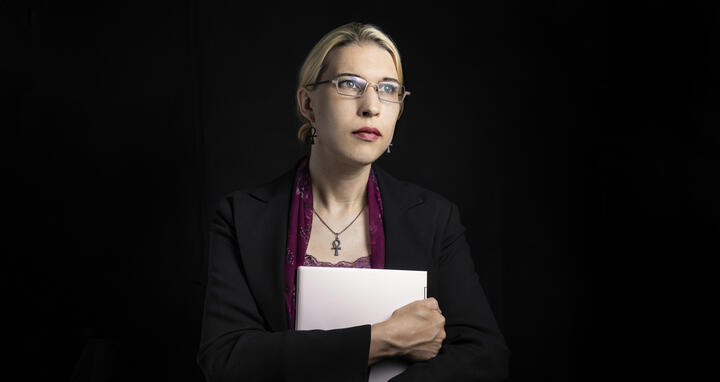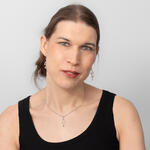How the heart and gut are connected
As a child Sofia Forslund especially liked to spend time with her grandfather. At Väddö, a small island on Sweden’s east coast, they went sailing and fishing, built treehouses, invented wild tales, read stories, and sang songs. But on her twelfth birthday something happened that has stayed with her to this day. Her grandfather died unexpectedly of a heart attack. He was only 62 years old. “I didn’t want to accept the finality of the loss,” says Dr. Forslund, “so I decided as a child to conquer death.” She first delved into philosophy to find evidence of the immortality of the soul. But it wasn’t until she read a book by the Swedish astronomer Peter Nilson that she became more hopeful. “It changed my view of the world,” says Dr. Forslund. “I suddenly saw that mathematics is in everything around us.” From then on, she wanted to use computational tools to understand the world. At 14 she learned to program.
Dr. Forslund studied bioinformatics and biochemistry at Uppsala University and Stockholm University.
Dr. Forslund now accepts she might not conquer death. Instead she wants to help people live as long and as healthy as possible. The bioinformatician, 38 years old with shoulder-length hair and friendly eyes behind black-rimmed glasses, sits on the balcony of the Experimental and Clinical Research Center (ECRC) in Berlin-Buch, a joint institution of Charité and the MDC, where she has worked since May 2018. “The memory of my grandfather still motivates me,” she says. “Today most people still die of a cardiovascular disease like he did.”
Big data for medicine
To change this, Dr. Forslund is focusing her research on the gut and not the heart. As head of the research group on Host-Microbiome Factors in Cardiovascular Disease, she analyzes the massive amount of biological data generated, for example, from DNA sequencing. The use of quantitative models enables her to decipher the role of gut bacteria in disease development.
Science is just beginning to understand how our health is influenced by the microbiome – the ecosystem of bacteria in our intestinal tract. These microorganisms are involved in processes that affect the entire body. They help digest food, render pathogens harmless, produce signaling molecules, and can activate immune cells. Some appear to promote health, while others can harm it. The cocktail of bacteria found in the microbiome differs from person to person – and is at least as unique as a fingerprint.
In a study published in Nature Microbiology in 2018, Dr. Forslund was able to show how the gut flora reacts in a sensitive way to changes. After twelve subjects were treated with a broad-spectrum antibiotic, their gut bacteria almost completely disappeared. It took six months for the bacterial community to normalize again. Like plants after a forest fire, the bacteria gradually returned, particularly at first those types of bacteria which can cause diseases. But some types of bacteria did not recover.
“The expertise I need for my work is in Berlin”
Dr. Forslund studied bioinformatics and biochemistry in Uppsala and at Stockholm University. In 2011, she joined the European Molecular Biology Laboratory (EMBL) in Heidelberg, where she worked in the lab of the microbiome researcher Peer Bork. During her stint there, she investigated, among other things, the effects of salt on gut flora. “Some people get high blood pressure from excess salt consumption,” says the scientist. This is a risk factor for heart attack, and something that also interests MDC researcher Dominik Müller.
The laptop is Dr. Forslund's everyday companion.
She already collaborated with Professor Müller in Heidelberg, participating in the DNA sequencing and mathematical analysis of stool samples. The teams were able to show that a high-salt diet causes the number of lactic acid bacteria in the gut to decrease. This is accompanied by a rise in blood pressure and an increase in the activity of proinflammatory immune cells. The targeted introduction of lactic acid bacteria then reversed these effects. “What interests me is whether we can turn an unhealthy gut flora into a healthy one and keep this condition stable over the long term,” says Dr. Forslund.
More detailed research must be conducted to determine whether probiotics containing beneficial gut bacteria can help with this.
Dr. Forslund is currently collaborating with Professor Müller on a study that observes the effects of fasting on the gut. “We want to know if fasting lowers blood pressure,” she explains. She also wants to study another technique: fecal microbiota transplantation, also known as stool transplantation. This involves transferring fecal matter from healthy donors into the bowels of ailing patients in order to reduce recurrent infections. In addition, Dr. Forslund will soon team up with other Berlin scientists to study how different dietary habits affect the gut flora. “Precisely the expertise I need for my work is here in Berlin,” she says.
She first made small changes to her appearance
The scientist is happy to be in Berlin for another reason, too. Here she can be open about being transgender. When she applied for the position at the MDC in 2016, she still had a male first name. But she had already realized in her early 20s that she could not continue living as a man. This was a side of herself that she had long kept hidden – especially at work. “I was afraid of being discriminated against,” says Dr. Forslund. She suffered so much from the conflict that she wound up with an anxiety disorder. One day in Heidelberg she met the US biologist Karissa Sanbonmatsu, who is also transgender and who had already come out. “Meeting her changed my life,” says Dr. Forslund. “Up until then, I didn’t have any role models. Now I saw who I could become in a few years.”
I don’t think people have to accept their body as it is. We can make of it what we want, as long as it helps us.
She plucked up courage and, little by little, made changes to her appearance. She started wearing nail polish and mascara and then began dressing differently. “When I received the offer from Berlin, I didn’t want to hide any longer,” she says. But at the same time she was worried. After having applied as a man, how would her new colleagues react now? “It was not a problem at all,” she says. “I haven’t experienced any negative reactions so far.” She signed her contract with her new first name: Sofia. Today she wants to be visible in order to embolden others like herself. “I don’t think people have to accept their body as it is,” she says. “We can make of it what we want, as long as it helps us.”
An app for prevention
As a scientist, Dr. Forslund wants to play a role in ensuring that certain diseases don’t develop in the first place. She envisions that one day implants could track the biological processes in our organism. While we live, eat, and sleep, such implants would regularly send measurements to an app that gives us daily recommendations on what our body currently needs in order to maintain a healthy balance. Should we eat certain foods or avoid others? Is it time to increase the dosage of a medication? Do we need to reduce stress?
The app, she says, would contain all knowledge about our genome and the makeup of our gut bacteria, plus data about our living habits and food preferences. It would be able to compute which diseases we are susceptible to and what we need to do to prevent them from occurring. “In the future, we shouldn’t wait until we feel sick to see a doctor,” says Dr. Forslund. She believes that healthcare should be a continuous process that is integrated into day-to-day life. “I see this as a big opportunity to keep people healthy and slow down the aging process.” Perhaps her work will one day help more grandfathers live longer and spend more time with their grandchildren.
Text: Alice Ahlers
Further Information
Antibiotics and microbiom: Regeneration in the digestive tract
Gut bacteria are sensitive to salt






